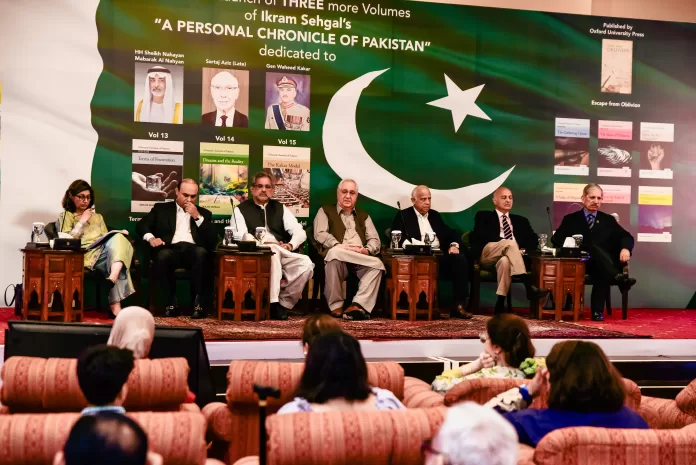The launch of the 13th, 14th and 15th volumes named ‘Terms of Frustration’, ‘Dreams and the Reality’, and ‘The Kakar Model’ in Ikram Sehgal’s series, “A Personal Chronicle of Pakistan” took place at the Serena Hotel in Islamabad on August 9, 2024. The event drew a distinguished gathering, including prominent academicians, businessmen, government officials, military officers, and diplomats. Elegantly moderated by Dr Huma Baqai the guests were welcomed by Zarrar Sehgal, Chairman Pathfinder Group. He expressed his deep gratitude in warmly welcoming the guests.
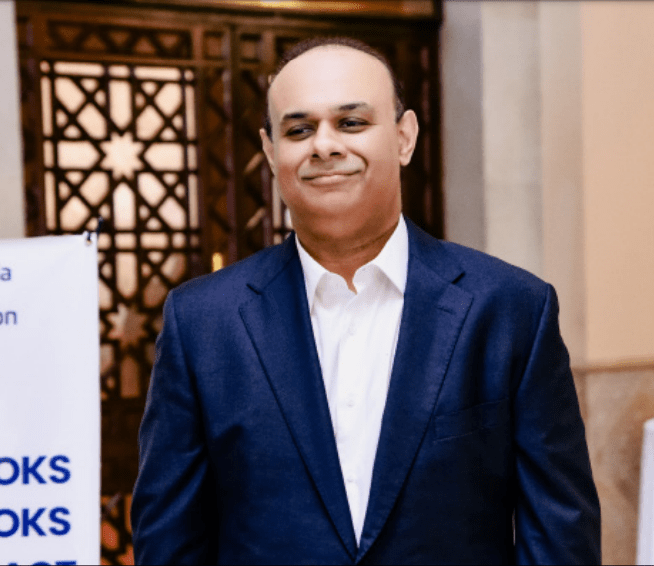
Zarrar Sehgal Chairman, Pathfinder Group
“Thank you, everyone. It’s a pleasure to welcome you all to the book launch of volumes 13, 14, and 15 of the Personal Chronicle of Pakistan. My father’s volumes serve as companions to the first 12 volumes that were launched over the past several years. They complement the earlier works. I’d like to extend a warm welcome to everyone, especially to our distinguished panel, and of course, to Huma Baqai, an old friend of ours who needs no introduction. She will fully introduce the panel. It’s truly our pleasure to have such distinguished guests, along with our family members my mother, my sister Nefer, and my aunts and it is particularly gratifying for my father, of whom we are all very proud, that his grandchildren are here as well. It’s heartwarming to see them come, and I think it’s very heartwarming for him to witness this. Now, obviously I could sit here and talk at length about these volumes, but they are not only personal reflections of my father’s observations about Pakistan. While they do cover political, social, economic, and historical events, they should also be seen as a guidepost, a map of what Pakistan can become. This is why I mentioned his grandchildren as they represent the future. There are many criticisms we can make about Pakistan, many avenues where we fall short, but sometimes we forget the raw talent this country produces. If we ever needed a reminder, we got it last night with an Olympic Gold Medal no less. The first gold medal since 1984 that Pakistan has achieved, the first gold medal Pakistan has ever won in athletics. I think you see, this highlights the raw talent we have in this country.
And, if you’ll pardon my bias, I believe you can see a raw talent in my father as well. He is very much a product of this country, with no education outside of Pakistan. He is completely born and bred here. A product of this system from an educational perspective, from a military perspective, from a business perspective, from an academic perspective, and from a journalistic perspective. His reflections, his articles, and his love for this country are a testament to that. So, I leave you with this thought: when you read these volumes, you will not only get a sense of the academic detail in them but also feel the deep love he has for this country. That is what I hope we all will take away from this. Thank you very much, and I look forward to an engaging discussion. Huma, I leave this in your capable hands. Thank you very much.
Dr Huma Baqai, Moderator
You know, I’m a bit overwhelmed today. Zarrar is right—the Sehgals have been great friends. Our journey together goes back over 20 years, and when we talk about raw talent, I was probably identified as a raw talent by Ikram Sehgal himself. He has mentored me throughout my journey, and my growth trajectory. In a small way, I’ve been a part of his academic journey as well. He has been kind enough to include me in all his book launches, and because of that, I’ve had the unique distinction of reading most of his work. It has always left me with the sense that there is so much that we can do, and so much potential in this country. It makes me wonder why we are where we are today.
These volumes contain a compilation of the writer’s articles published in different newspapers over a period of 40 years. That’s a long time, ladies and gentlemen. While going through the last three volumes, I realized that he has painstakingly captured the talks and conversations he’s had with different people, conversations that offered deep insights into the issues we face today, issues that now stare us in the face.
The news yesterday left us all happy, but it also an indication of the fact how desperate we are for good news. Social media went crazy. We were desperate for something good to happen, and it did. I hope it is the beginning of many more good things to come, one of which is perhaps the launch of these three books. He is a very prolific writer, and not just that he writes on a wide array of topics. He covers all the stuff you would expect from a Pakistani columnist on what’s going on this week or this month. But while I was going through these books, and others can comment on this too, I found an element of timelessness to what he writes. The fact that he has chosen to dedicate the last three volumes also speaks to how he can this man give credit, acknowledges people, and allows others to stand tall. I think that’s something very few of us possess today. This series is a sobering comment on Pakistan’s civil-military relations, its frustrations, its dreams, its reality, and of course, the Kakar model. But before I move on, ladies and gentlemen, we have a very nice message from His Excellency, Prince Nahyan. There are just a few lines I want to quote from Nahyan Mabarak’s preface to Terms of Frustration, where he speaks about Ikram Sehgal. He says, ‘Ikram Sehgal has a great story to tell, and he tells it in a very compelling fashion.’ We have a video message from Nahyan Mabarak, which we will play now.
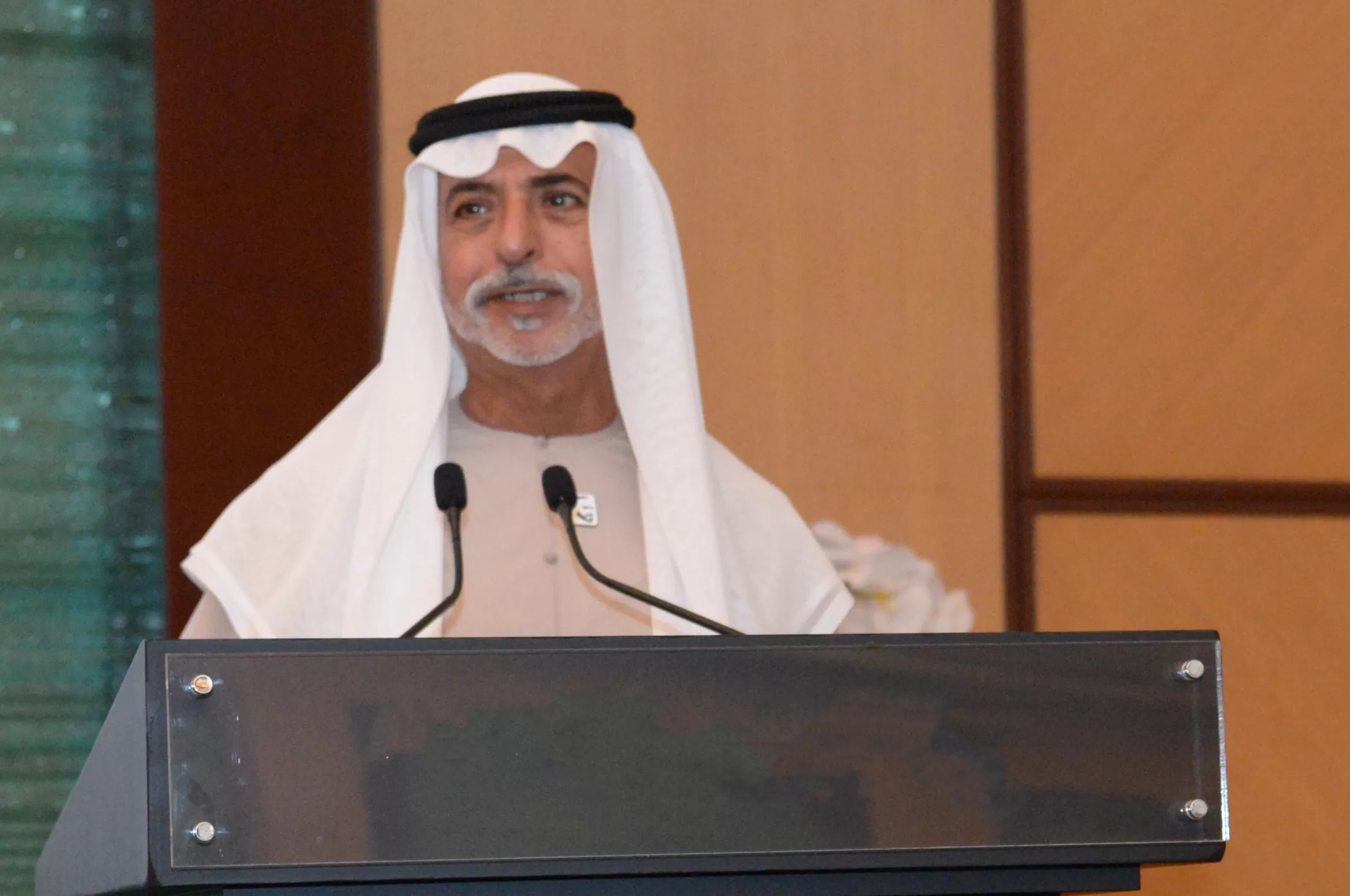
HH Sheikh Nahyan bin Mabarak Al Nahyan, Speaker
Dear brothers Ikram Sehgal and Zarrar Sehgal, sisters, brothers, and friends, ladies and gentlemen, Assalam o Alaikum. Greetings and best wishes from your brothers and sisters in the United Arab Emirates. I regret that I am not able to be in Islamabad with you for this celebration of my brother Ikram’s three new volumes in his impressive series, ‘A Personal Chronicle of Pakistan.’ However, I am with you in spirit, as I am very proud of my brother Ikram Sehgal. I have long admired his achievements and experience, and have valued his counsel and advice. Even more importantly, I have always admired him as a dedicated person of high moral standards and values. He has never strayed from the founding principles and values of his beloved Pakistan.
As a talented and prolific writer, Ikram Sehgal has, in all his writings, communicated those values and principles with clarity and authority, always staying true to his nation’s culture and heritage. He has encouraged others to understand the vital role of patriotism, love of country, we well as and dedication to moral values and principles in the success and progress of Pakistan. On behalf of everyone assembled for this launch today, I thank you, Brother Ikram, for telling your remarkable story, which is intertwined with the story of Pakistan itself. In my opinion, the three volumes being launched today, in fact the entire 15 volumes in your exceptional series, will inspire young Pakistanis and others in many countries for generations to come. This is a series written from the heart, reaching the hearts of its readers.
You, my brother Ikram, have done an outstanding job in capturing the spirit of Pakistan. A spirit of commitment, cooperation, dedication, courage, and perseverance has enabled Pakistanis to live and work together harmoniously for the well-being of their nation and its people. My dear brothers and sisters, these new volumes are filled with wisdom from a very wise author. The entire series is a delight and instructs, displaying the elegance of Ikram’s writing as well as his important and active contributions to the history of Pakistan. Above all, we appreciate how Ikram’s ideas and values are both relevant and meaningful to men and women everywhere. In my opinion, Ikram is not only a great writer, but he is a great person who stands as a striking emblem of the intelligence, creativity, and productivity that characterize Pakistan’s vitality and vigour. We are privileged to honour Ikram today. From where I stand here in the United Arab Emirates, I am also immensely proud of the strong relationship between Pakistan and the UAE. We in the UAE deeply value our longstanding and deep-rooted brotherly relationships with the people of Pakistan, and we are keen to enhance them in the future.
It is now my great pleasure to invite you to join me in wishing my brother Ikram continued success, happiness, and good health. We will honour him as readers of the 15 volumes of this wonderful series. We will read his chronicles, learn from them, share them, and use them to spread awareness, enlightenment, and appreciation for Pakistan, its history, and its progress. We will use them to look forward to the future of Pakistan and its growing position in the world with great confidence and optimism. My best wishes to all of you and all the people of the great country of Pakistan. May God’s peace, compassion, and blessings be with you all. Thank you very much.”
Dr Huma Baqai, Moderator
Ladies and gentlemen, Terms of Frustration is the 13th volume of the Personal Chronicle of Pakistan series. The book is divided into seven sections and comprises a total of 96 articles. The foreword is written by the man you just heard. A member of the Emirati Royal Family, a politician, and currently the Minister of Tolerance of the United Arab Emirates. Ikram Sehgal has also dedicated the book to His Excellency. This work holds both current and historical importance, offering readers an invaluable perspective on Pakistan’s journey. The book covers the years 2021 and 2022, serving as a personal history of Pakistan. These were interesting years, marked by the COVID-19 pandemic, which had several negative impacts on the global economy. The world’s collective Gross Domestic Product (GDP) fell by 3.4%. Global supply lines were disrupted, jobs were lost, and the battle between lives and livelihoods continued. Pakistan did fairly well on the COVID-19 front but faltered in other areas, all of which are chronicled in this book. Today, we have some very learned and interesting people individuals with intellectual depth who will come and speak about the books we are launching. It is my honour and pleasure to invite Air Marshal Masood Akhtar, a gifted airman and also a scholar, to the stage.”
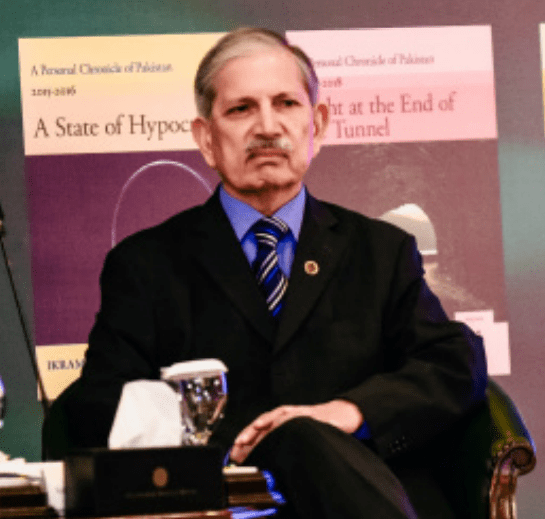
Air Marshal (R) Masood Akhtar, Speaker
Bismillah Ar Rahman Ar Rahim. Honorable Panelists, Ikram Sehgal, Mr. Ali Kuli Khattak, Ladies and Gentlemen, Assalam o Alaikum. It is a pleasure to speak at this book launch. I’ve attended the previous two launches as well, but this one is particularly unique because I have a personal connection with the third book, which is based on the Kakar Formula. The first chapter relates to me in some way. I have known Ikram Sehgal since the year 2000 when I was Commandant at the Air War College, but our close interaction began in 2002 when I was Chief Instructor at the National Defence Course, looking after the National Security part. I and Kamal Aziz were in the War Course together, and later I shifted to the National Defence University (NDU).
At that time, we were groping in the dark on how to process national security, and I’m being very honest about this, we didn’t know how to approach it because we didn’t have a template. The first template came when General S.P. Shahid returned from America with a template by Ambassador Blackwill. I then invited Ikram Sehgal to help us, and he brought with him a book that he had meticulously researched. He had delved deeply into the subject for our sake and Pakistan by studying American national security policies and those of other countries.
Ladies and gentlemen, I’m pleased to tell you that most of the ideas that Ikram Sehgal introduced are still taught today at NDU. Of course, not all the credit may go directly to him, but recently when I visited NDU and spoke to the President. I mentioned that 70-80% of the material in the national security policy papers that they produce and finalize every year, originates from what Ikram Sehgal left behind.
Coming to what he has written in this volume, I’d like to read an excerpt and then build on it. In the preamble, he says:
“Founded a little more than 50 years ago as one of the finest experiments in nationhood of the 20th century, Pakistan entered the 21st century as a truncated version of its original creation, uncertain about its future, its place under the sun, its identity, etc. Indeed, it lacked a coherent vision for the future. The omens and the symptoms we see today were already present. The invisible disintegration of the national fabric has been so rapid that the deterioration of our integrity is in an advanced stage. More than any strategic or tactical design, it is the vagaries of destiny, the dictatorial tendencies of a democratically elected Prime Minister that sought a civilian coup, countered by the military that stopped the rapid slide down to oblivion.”
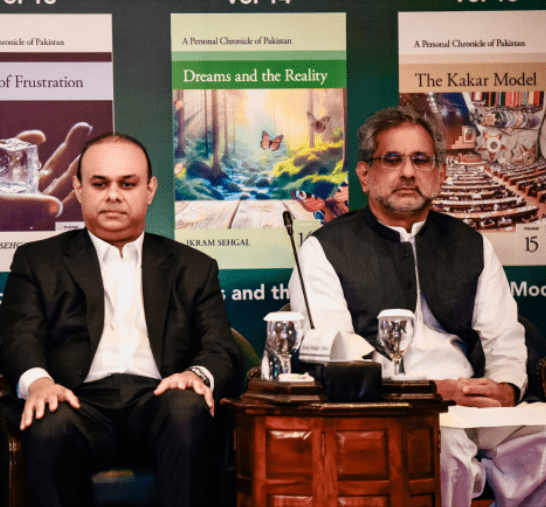
He goes on to talk about what happened and says about General Pervez Musharraf:
“It would be a wonderful story to say that General Pervez Musharraf’s military regime took over and, with a magical wand, created a paradise overnight. This would be a travesty of facts. What the military regime did was commendable, but in a relative manner. It slowed the momentum of disintegration, stopping the country momentarily from becoming extinct. Pakistan very much remains an endangered species, and we still do not have an inherent National Security strategy.”
The credit for us being able to produce a National Security Policy document every year goes to Ikram Sehgal. He created a book out of his research and provided it to each one of us at the faculty and the students. Some of us read it, some didn’t, but when this book came to me, I requested a PDF version, which I still have. If anyone form you wishes to have it, with permission from Ikram Sehgal, I can put it in your Inbox. However, what he said remains ominous today, ladies and gentlemen. We do not have a national security policy document, except the first one that came from Dr. Moeed Yusuf under Imran Khan. I happened to interact with Dr. Moeed Yusuf because someone mentioned that he needed some help. I told Dr Moeed that there are two things we must address: first, how do we deal with all these groups that are at war with each other, leading to Pakistan being relatively at war with itself; second, how do we reduce this insurgency to zero? No political party has these two solutions in their manifestos. I have raised this issue over and over again on all my groups on WhatsApp, where we have two-star, three-star, four-star generals, federal secretaries, prime ministers and ministers. We seemingly don’t have a solution for what to do.
As a result, every second week, third week, or month, we are losing 10 or more of our brave soldiers, including Lieutenants and junior officers. The Army does a commendable job, and if Azm-e-Istehkam is to can come and I’ve said this on television, these young officers and soldiers will win, but at a very high cost. Sanctuary exists on both sides of the border, and we will pay a price. Unfortunately, probably because of what Ikram Sehgal Sahab has said, we do not have the correct national security direction, we are going to pay a very heavy price.
Secondly, the three major institutions are absolutely on a collision course. What happens tomorrow, a week from now, or three weeks from now, no one can tell. Things are not looking good. Will Pakistan be able to find the Holy Grail of its national security? Ikram Sehgal has played his part. He has given us the blueprints and continues to work day in and day out on these subjects. Only time will tell.
The Kakar Formula at least delayed what could have been worse than martial law. Musharraf did postpone a disaster for a little while, but to say that we have secured ourselves would be misleading. My humble suggestion is that we have not. Will we be able to find this Holy Grail? I cannot foresee it, but Ikram Sehgal, sir, thank you very much for your contribution. What you did for us at NDU, I keep coming back over and over again to repay this debt back to him.
When Pervez Musharraf became the President, and I’m using a very polite word here, he ‘borrowed’ one of your ideas and presented it as his own. When Ikram Sehgal came and complained to me and I said, ‘Sir, I am a small twostar; I cannot do much about it.’ I’ve since forgotten what he said, but he may like to dilate more on this.
That’s the quality of what Ikram Sehgal produces. It is a good thing he has done for NDU/ three of his articles later on from The NEWS were part of the National Security Folder that was taught to the officers at NDU. What bigger contribution can anyone make and I think we owe thanks to Ikram Sehgal Sahab as he has done good to NDU, good to me, good to Pakistan. We wish him continued success and hope that he continues to do more. Thank you.”
Dr Huma Baqai, Moderator
Thank you, Air Marshal Masood Akhtar. Your comments were sobering, but they also carried an element of hope. A country at war with itself, with our politicians unable to provide a solution, and institutions working at cross purposes—inter-institutional and intra-institutional conflict has become the norm. We are, in some ways, normalizing that conflict, and internalizing it, and all of us will likely pay the price for it. This is the perfect time to invite Senator Mushahid Hussain Syed, a politician, a journalist, but also someone who has the courage to speak the truth.”
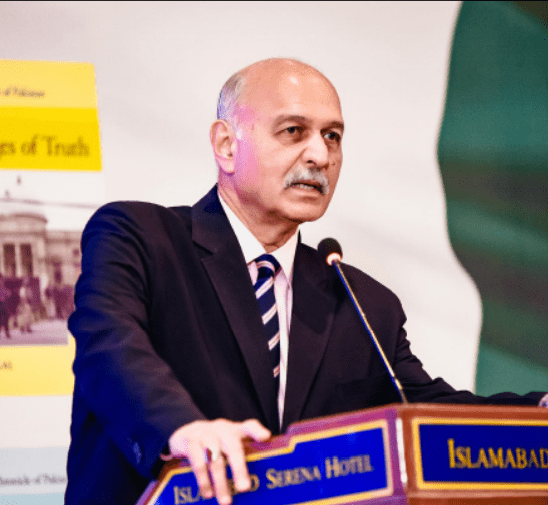
Former Member of the Senate of Pakistan
Senator Mushahid Hussain Syed, Speaker
“Bismillah Ar Rahman Ar Rahim, Thank you, Dr. Huma Baqai. First of all, my compliments to my dear old friend Ikram Sehgal and his esteemed family. In our culture, despite difficulties and adversity, if you have strong families as a source of strength and resilience, it gives you the courage to speak truth to power, which my friend Ikram Sehgal has been doing for the last 30 years, often at tremendous personal cost and perhaps also to his business interests.
It’s a pleasure to be here, and it seems that with the increase in volumes by Ikram Sehgal, his readership has become more widespread and popular beyond Pakistan’s borders. Just before the launch of the book on the Kakar Model, this model was duly implemented in Bangladesh a week earlier, executed with the same precision and seamlessness in Dhaka as it was in Pakistan in 1993.
I think this is probably a decision that every upright professional Army Chief finds difficult and is a moment which every Prime Minister or President dreads. It’s when the Army Chief goes to the Prime Minister or the President and says, ‘Sir, Madam Prime Minister, Mr. Prime Minister, your time is up, please go home.’ General Abdul Waheed Kakar did that with President Ghulam Ishaq Khan, with Prime Minister Nawaz Sharif, and eight other important officeholders in 1993, four Governors and four Chief Ministers. Having known General Kakar, who is probably one of the most respected Army Chiefs in the history of Pakistan, I can say he was squeaky clean and the most non-controversial Army Chief. He was the only Army Chief in the history of Pakistan to actually refuse an extension, it says a lot.
When Ikram Sehgal dedicates this volume, the Kakar model, to General Abdul Waheed Kakar, I think it is a well-deserved honour for one of the distinguished sons of the Pakistan Army. When we discuss issues, as mentioned earlier, and look at the whole gamut of civil-military relations since the Kakar model, we have had other models also developed, but they were clumsily done. Soft coups have taken place, military coups have taken place, and the consequences have not been controllable. The root causes are three different but separate elements, which I’d like to briefly discuss. Ikram Sehgal mentions it in his book when he says that General Kakar when he asked for the en masse resignations of the top leadership, including the person who appointed him, President Ghulam Ishaq Khan, was quite surprised that President Ghulam Ishaq Khan felt that General Kakar man was his man.
I think this has been a major problem for every Prime Minister, the assumption is that when you appoint an Army Chief, that person will do your bidding over and above the interests of the institution and the country. In 1977, when Mr. Bhutto appointed General Zia-ul-Haq, superseding six generals, and there was the agitation of the PNA, his good friend, the sister of the Shah of Iran, Princess Ashraf, came to Pakistan in May 1977 and this is written in her book also. She was close to Mr Bhutto and asked him, ‘Zulfi, what’s the problem? It seems the Mullahs are after you, but what about the military?’ Mr. Bhutto replied, ‘Military? No, don’t worry about that.’ There was a banquet at the PM House, and he pointed to a man sitting at the third table, slightly dark and short, and said, ‘That man is the new Army Chief. I’ve specially picked him. His name is General Muhammad Zia-ul-Haq, and he is in my pocket.’ He patted his pocket as he said that.
Ghulam Ishaq Khan had the same misconception as General Kakar. Just before his retirement Gen Kakar was an accidental Chief as he had to be appointed at the sudden death of Gen Janjua and Ghulam Ishaq felt that Gen Kakar would be his man. Nawaz Sharif had the same misconception about General Musharraf and later on General Bajwa. I remember Ikram and I were guests of Mian Nawaz Sharif in Murree when the issue of appointing an Army Chief came up. As His Royal Highness Prince Nahyan Mabarak Al Nahyan rightly said, Ikram speaks the spirit of Pakistan, and one of the elements of that spirit is speaking truth to power. Ikram said, ‘Mian Sahib, just follow the seniority principle. There are three nominees. Don’t try to cherry-pick; don’t think any of them will be your man. Do it the proper way.’ He also advised on who should be the most deserving President of Pakistan, he also named him. But Mr. Nawaz Sharif did not follow either piece of advice.
This obsession with ‘Mera Banda’ continued. Imran Khan felt General Bajwa was his ‘Banda’. They all talk about extensions, and the second problem in Pakistan is that while Prime Ministers have an obsession with ‘my man,’ Army Chiefs also have an obsession with the extension issue. They are very keen on it, and the extension issue is destabilizing the institution, the political system, and civil-military relations. This has happened in the past and has happened recently as well. The third element, which is extremely important in understanding the civil-military divide, in my view, is that the establishment of Pakistan, primarily the security establishment, has an obsession with what General Zia used to call ‘positive results.’ They believe that elections should be tailored, organized, and engineered in a manner that the political outcome should be one that is preferred by the powers that be, the establishment. When the February 8th elections recently took place, a foreign journalist, a “Western journalists” asked me, ‘What happened? We thought the votes were cast in one direction, but the results were different.’ I said, ‘In Pakistan, we follow the dictum of the great Stalin who used to say, “It’s not important who votes in the election. What is important is who counts the votes.” This dichotomy was witnessed in this election also.’
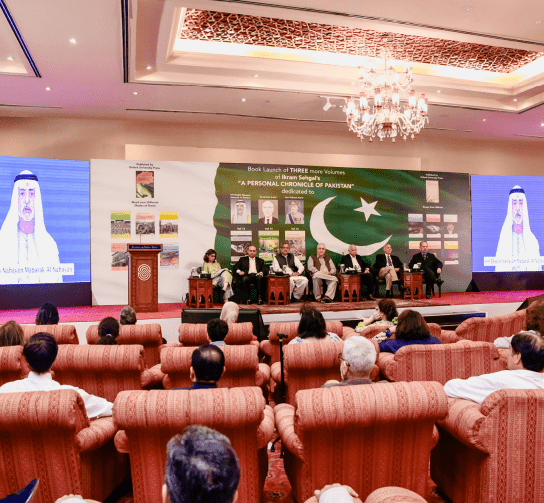
Ikram Sehgal’s works, while being critiques of the process, also serve as primers for students and scholars on what goes wrong and how to reverse those wrongs. I feel that in Pakistan, despite the difficulties and despite the doom and gloom, I feel there is a spirit among the people of Pakistan. They are courageous enough to speak up, to resist what is wrong, and to the courage to defy when the state pursues policies that are at variance with the interests of the people.In this current situation, despite the difficulties, I remain optimistic that in the region Pakistan has strategic space and an opportunity to play a larger role in the region once we are able to set our own house in order through respect for the rule of law, respect for the popular mandate, and reversing wrongs such as human rights violations. What has happened in Bangladesh and I’m sure for Ikram this is a very moving story be cause he is a genuine, authentic ‘Made in Pakistan’ product with roots in both what were then East and West Pakistan. He understands the ethos of the people. I think that is an inspirational story, and we hope that we can learn some lessons from the latest Bangladesh model, which shows that a time comes when people stand up and wrongs are reversed through popular might.
This proves that might is not right, but right is might. I wish Ikram Sehgal all the best. More power to your pen, sir, and we look forward to continuing our long journey intellectual, we have been friends for two centuries, we were friends in the 20th century and are buddies in the 21st century, I look forward to our personal, and professional together Insha Allah. Thank you very much.”
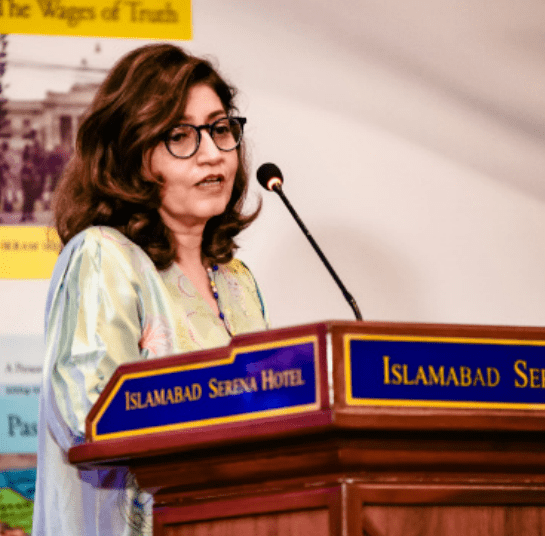
Dr Huma Baqai, Moderator
Until the gold in the Olympics happened, all we were talking about was Bangladesh. What happened in Bangladesh is a sobering experience, or rather, a sobering moment for many in South Asia. Sheikh Hasina was in power for 15 years. She had the military on her side, the bureaucracy on her side, the media on her side, and also had a very powerful neighbour on her side. Yet, what unfolded on the ground was not led by politicians; it was led by the youth. They continue to dictate the terms of what is going to happen in Bangladesh, including who is going to be the head of the interim government—Muhammad Yunus.
The biggest concern that arose from all of this is that Bangladesh has a history of military coups. It has happened twice, with several aborted attempts and soft coups as well. We all wondered: is Bangladesh once again moving from a civilian dictatorship to a military takeover? The students there are trying to ensure that this does not happen, and that is what the 21st century is all about, the power of information. The proliferation of information is turning the tables on many who thought they were untouchable. Ladies and gentlemen, the book ‘The Kakar Model’ is the 15th volume of the ‘Personal Chronicles of Pakistan’ series. The volume is divided into three sections, comprising 27 different chapters. The foreword is written by Lieutenant General (Retired) Ali Kuli Khan Khattak, who is here himself to elaborate on it further
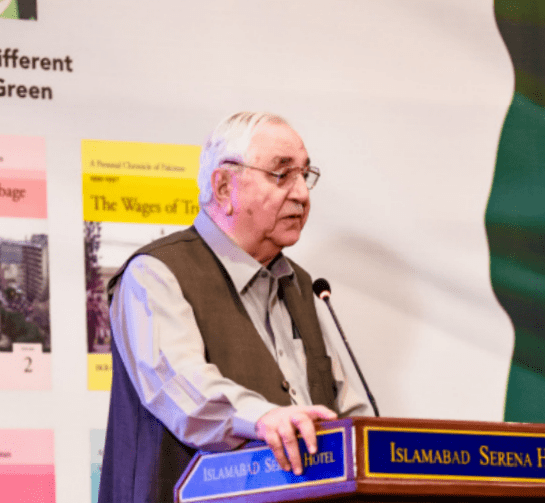
Chairman, GTR
Lt Gen (Retd) Ali Kuli Khan, Speaker
“Bismillah Ar Rahman Ar Rahim, Ladies and gentlemen, distinguished as all of you are, I don’t have a long speech. This is a message from General Waheed, which I am going to read word for word. It’s just a page or so, and then I will take the opportunity to talk about other issues.
This message from General Waheed says
‘Dear Ikram, let me at the outset apologize for not being present in person at this important event due to health reasons. I have taken the liberty of sending this message to be read out by Lieutenant General Ali to express my feelings. I want to thank you personally for dedicating Volume 15, “The Kakar Model,” to me. While I feel humbled by the recognition, I was only doing my duty as a soldier and as a patriotic citizen of Pakistan. As COAS of the Pakistan Army in 1993, I had to act when the political structure was collapsing and becoming an existential danger to the country. In the larger interest of the country, I had no option but to take action. Yet, the Army did not actually take over but acted strictly as per the Constitution. The Speaker of the Senate replaced the President, who resigned; a caretaker Prime Minister replaced the Prime Minister, who has also resigned. The person chosen was agreed upon by both the outgoing President and Prime Minister. While remaining within the constitutional framework, the President and caretaker proceeded to then conduct free and fair elections. Not one single military person interfered in any way in the elections.
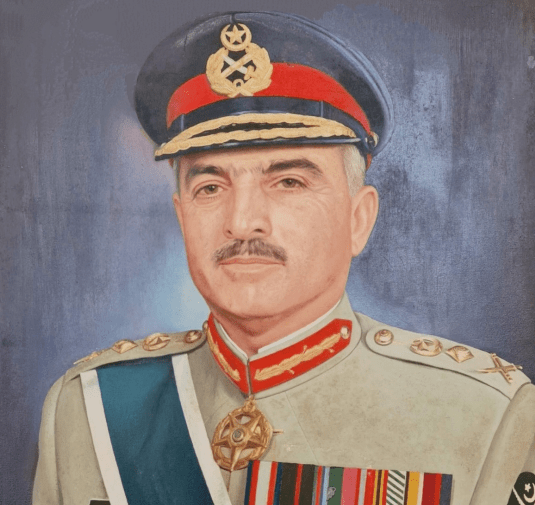
Sometimes military interventions are necessary in the life of a nation, but only for a short time and only to keep the country from deviating from its given destiny. The military should avoid getting involved in governance, even for the shortest period. Ikram, you are a brave and outstanding soldier, a great loss to the Army. You have continued with remarkable brilliance in civilian life in diverse fields. You have done wonderful work for this nation, and I am personally proud of you as one of the most upright and patriotic Pakistanis that I have met. Your stance has always been honest and morally correct, as reflected in your articles and media interviews. Your work is a must-read, not only for the intelligentsia but for those appearing in competitive exams, both in civilian and military life. While thanking you for dedicating the 15th volume of the ‘Personal Chronicles of Pakistan’ to me, I wish you the very best for the event and the future. My Salaams to the assembled audience.”
I would just like to add a few personal remarks because I got to know General Waheed when he was promoted to Major General and I was promoted to Brigadier. We both landed in Sukkur, and that was the first time I actually met him face-to-face. Although we knew of each other—he came from a very distinguished family in KPK, being Sardar Abdul Nishtar’s nephew—this was our first meeting. We had a very interesting time both in Sindh, hunting dacoits, and later on, I had the privilege of working closely with him. It was an absolute wonder to work for a person like him. There aren’t many people like General Waheed. At the time when General Waheed’s tenure was coming to an end, Benazir Bhutto was the Prime Minister, and Farooq Leghari was the President of Pakistan. The entire diplomatic corps, most of all the Americans, begged him to take an extension, but his answer was pure and simple: ‘There are many more like me from where I come, and no, I will not take an extension.’ That was probably his greatest point and his greatest service to this country. He was very clear about this.
Now, I have to mention some personal aspects of Ikram. Ikram is someone I discovered in my life. Of course, we came from opposite schools. I am an Aitchisonian, he is a strong Gallian—but we got together when we joined Army Aviation. That was around 1969 or onwards, and things were happening in what was then East Pakistan. I remember Ikram was, of course, deeply hurt like any Pakistani would be, by the happenings at that time. He was very disturbed. I remember in one of his conversations with me, he said, ‘It’s time to do a surgical operation.’ I’m not going to delve into the details about East Pakistan or the Bangladesh issue, but, ironically, the saying ‘what goes around comes around’ is so true.
After so many years, when Bangladesh was formed, we had that awful picture of General Aurora making General Niazi sign the surrender document, which the Indians and the Bangladeshis passed everywhere. That picture is now being put side by side with one in which Sheikh Hasina is signing her resignation, and there are three flags visible: a Bangladeshi flag, an Indian flag, and believe it or not, a Pakistani flag. That gives me some sort of relief—not pleasure, but at least it takes away some of the shame when I look at the picture of Aurora making General Niazi sign. One of the things Ikram taught me all along, despite being much younger than me, is his wisdom and knowledge about what was East Pakistan. It’s understandable because, as Mushahid mentioned, he represented both sides and knew them very well. He talked, and of course, he was being heard, just as all Pakistanis were hurt about what happened in 1971. But he must have felt it most of all, and unfortunately, some very unfair and cruel things were said about him, which were false and not to be believed. When I saw the picture of Hasina signing, I asked Ikram what he thought, and I hope I got it right when he said, ‘Two countries, one nation.’ Have I got it right? Two countries, one nation. I don’t know what is going to happen in what is now Bangladesh, but it does seem that a lot is happening, and God knows which way it will go. But he had the insight to make that one statement, which I think embodies everything.
It has been my pleasure to know Ikram for a long time, and it’s always been a pleasure. He initially used to call me his wingman, but with time going on, I am now his old wingman because he is the one who guides me in most things in my life. I wish Ikram the very best, and Inshallah, we will have happier days to look forward to. God bless you all. Thank you.”
Dr Huma Baqai, Moderator
Thank you, General. Now, we come to the volume, ‘Dreams and the Reality.’ This one is close to my heart for two reasons: first, because I had the honour and pleasure of meeting Mr. Sartaj Aziz, not on my land but in New Delhi; and second, he was the Vice Chancellor of Beaconhouse University, and I am now a Vice Chancellor myself. That connection is truly special to me. When I met Sartaj Aziz in New Delhi, we were both representing Pakistan. I was there representing the Karachi Council for Foreign Relations, of which Ikram Sehgal has been a crucial part; in fact, he’s the driving force behind it, and it has grown by leaps and bounds under his mentorship. During that meeting, I was a young lecturer at Karachi University, and Sartaj Aziz, with his impressive stature, approached me and simply said, “Hey young woman, what do you do and where?” When I told him I was in Karachi and taught at the university, he replied with just one word: “Start writing,” and then walked away. That brief interaction has stayed with me, and I took his advice to heart and started writing. His impact on many people’s lives has been profound, and Mr Ikram Sehgal has dedicated this book to his memory. The foreword is written by Dr. Sania Nishtar. To speak further about it, we have a man who knew Sartaj Aziz well. They were both in the same political party and who is now working to build another party. Mr. Shahid Khaqan Abbasi, Sir.

Shahid Khaqan Abbasi, Speaker
Bismillah Ar Rahman Ar Raheem. Ikram Sehgal, distinguished ladies and gentlemen. It’s a privilege to be here, and I thank you for inviting me. I cannot claim to have read all of your books, but I have been reading your articles as they have come out over the last 30 years. When I looked at the book before coming here, the sad part was that it felt as if I was reading about today. We have made your books timeless. It’s the same story and the same events, and it seems that we have learned nothing from history. It’s a very sad reflection of where we stand today, and we always look for people to blame. The reality is that we have nobody to blame but ourselves. There are no heroes here.
We had people like Sartaj Aziz to whom this book is dedicated. I had the privilege of knowing him for many years, from when I was a very young member of Parliament until I became the Prime Minister. Pakistan has produced few people like him, a man who understood history, who worked hard, who had values, who had courage, and who could speak the truth. He also wrote a book, and there are many Pakistanis who have written books, there are Generals, bureaucrats, and politicians. I think only three books have truly impressed me because they spoke the facts. They were not about praise for the author or his contemporaries, who in the books are all portrayed as perfect people. So the question always is: what went wrong? What went wrong in Pakistan? Why are we where we are today? Sartaj Sahib wrote a very objective book. He stated the facts as they were, and I was a witness to many of them and he lived a truly wonderful and productive life, even until the last minute. I met him a few weeks before he passed away. He knew all the events, he remembered everything, and we talked about many things that we had observed together or had been part of together, including the amendment that brought FATA into the national ambit.
That’s a story in itself, but I can tell you that would not have happened if Sartaj Aziz had not written the report on how that amalgamation should take place. When we started the process, there was a lot of pressure, people came and said, ‘Oh, we want this.’ The military said they wanted this, and the FATA people asked why we were not doing it. But when the time came to do it, they all started backtracking and they all had questions. All I had to do was call Sartaj Sahib and pose the question to him. He would say, ‘Okay, go to page 36 and read paragraph 4,’ and the answer would be there. This response came from a man who was over 90 years old. We have had people who have contributed to this country, but very few have made a real contribution. That’s the sad part.
Whether you’re a General, a bureaucrat, or a politician, at the end of the day it’s about public service and contribution. How many of us have truly contributed? That is the real question. I can say Ikram Sehgal has contributed. This compendium of books is a contribution. We can go back someday, look at them, and see what happened in Pakistan. But it’s really a very repetitive story. I’m from the generation that has seen the transition, from the generation of General Ali Kuli Khan and Ikram Sehgal. We’ve seen these events repeat themselves over and over again.
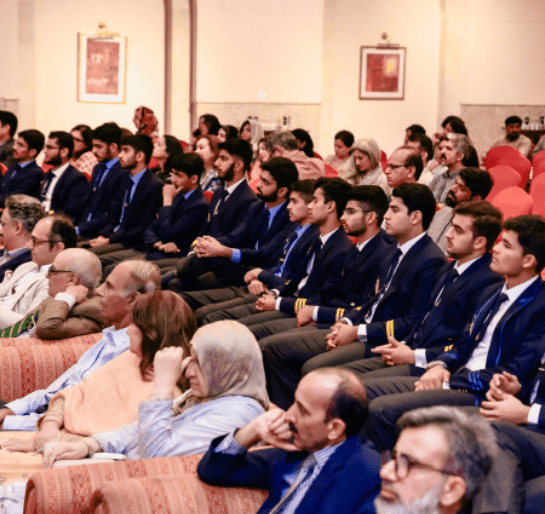
Air Marshal Masood Akhtar talked about the Holy Grail, fortunately or unfortunately, the Holy Grail is here and it’s called the Constitution. Please read it, please abide by it. People ask me what the problem with our country is. I say it’s very simple: read the Constitution. It’s one of the few constitutions in the world where the oaths are also part of it. The oath that politicians take, that bureaucrats take, that judges take, that military officers take, the problem is all of them violate that oath every day. That’s the problem. We happily rig elections, and we happily accept that rigging very graciously, we accept it. I’ve been part of every election since 1985. Except for the 1985 election, they’ve all been rigged to some extent. The other events that led to the elections were also unconstitutional and undemocratic. I had the sad privilege of being a 32-year-old Member of Parliament when the President of the country passed me a paper and said, ‘Sign it, this is my resignation from Parliament.’ When we look back at history, it’s a very sad history. As I said, there are really no people that I can look up to in politics or during the period I spent in government or the power corridors of the country, except people like Sartaj Aziz, who actually contributed.
So these are difficult times, but you will find the solutions in adherence to the Constitution. There is no other way. If the people make a mistake at the polls, let them make a mistake and let them suffer the consequences. Because when you do not honour the mandate, the nightmare you will create is a much bigger problem. That is what we need to do today. We need a national consensus today; we need to reconcile ourselves. Pakistan needs to know the truth. We need a Truth Commission. We are at war with ourselves. We don’t even need reconciliation just let the people know what the truth is. The truth is not what you read in the papers, it’s not what you see on TV. It’s very different. You get to know the truth many, many years later who did what to whom and why. These are all very small, petty issues that result in where we are today. Small, petty, personal issues. That’s our problem. We do not have people who can rise up and say what is right, and who have the courage to speak the truth.
Today, if you look at Bangladesh, it has a fallback situation. Pakistan today does not have a fallback situation. It’s a very difficult time for Pakistan. I think one gets kind of carried away with this thing, but wherever you go, people want to know what’s going on, and people are losing hope. It’s a few people, not 200 people it’s six, eight, or ten people who need to sit together and chart the way forward for this country. History will not forgive them, and these are all because of small, petty interests that they are unable to sit together.
Let me come back to Ikram Sehgal Sahab. We know each other well, but we don’t actually really know each other as we have spent very little time together. He has always invited me, but unfortunately, we’ve not been able to spend much time together. However, I know him very well. In 2018, he invited me to his annual event, which is the breakfast at Davos. It was quite an event. He invited everybody; it was very early in the morning on a very cold day, and it was a wonderful event. I enjoyed it and learned a lot.
I had an uncle in the military who was a very aggressive man and somewhat controversial—reasonably controversial. As we grew up, he told us stories about what happened or what did not happen. This is about what Mushahid Hussain said about seniority being the only factor.
My uncle said that when he was a young officer, they were sitting in a bar having a beer when they were called out and told that the war was going to happen the next day, so they had to report to their units. He said that he went to the front, and the other person went to the CMH. Many years later, my uncle retired as a Brigadier, and the other person became a four-star General. I know Ikram Sehgal through my uncle.
I was reading a book the other day, and it talked about Maulana Rumi, who said something that’s probably on his epitaph as well. He said, ‘When we are dead, seek not our tomb in the earth. Find it in the hearts of men.’ That’s legacy. I’ve met politicians, Generals, and Judges who say, ‘I’m creating a legacy.’ You do not create legacies. This country is suffering because people are trying to create legacies. But Ikram Sehgal has a legacy. I asked my uncle about him, and all he said was that Ikram was a brave man they served together. That is Ikram Sehgal. Thank you very much.
Dr Huma Baqai, Moderator
I will now invite a living legend, the author himself to this stage. Ikram Sehgal gives employment to over 15,000 people across the country. Many people give employment to people but I think if the state starts taking care of its people the way Ikram Sehgal takes care of his employees, the situation in the country would be very different. Ladies and gentlemen, the author himself.
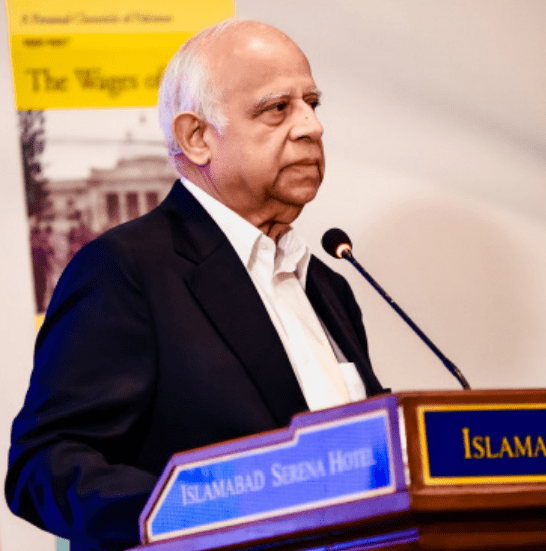
Ikram Sehgal, Co-Chairman Pathfinder Group
Bismillah Ar Rahman Ar Raheem. Thank you, Huma. Before I come and thank the panellists, I would first of all like to acknowledge the oldest man in this room, Brigadier Mehmood, my Commanding Officer. Sir, thank you for being here. One of the most upright people that I’ve ever known in my life. Candid, always spoke the truth and actually showed us the way of how to stand up for the truth and he still stands up for the truth at this age. His writings are also very candid and I wish more people would read about them.
Let me start with the First Volume, ‘Terms of Frustration’ dedicated to Sheikh Nahyan. I came to know Sheikh Nahyan when I was made a member of the board of Directors of Habib Credit Enterprise Bank which was Bank Alfalah there were three branches – Sheikh Nahyan had bought the majority shares at that time. I was appointed to represent the PMLN government at that time and to represent the 26% share the government had. When I first went to meet Sheikh Nahyan, in the first meeting, he asked me what I knew about banking. I said, nothing because I did not know anything, I came out of the army thinking that ‘LC’ (Letter of Credit) was a girl. Similar was my banking knowledge. He said okay, learn. So, it took me about a couple of years to understand banking transactions, banking terms, etc. Then he started giving me more and more things to shoulder, including actually opening up Bank Alfalah in Bangladesh. I opened up the branches, expanded the branches and not many people know that and I’m very sorry to say that recently, they’ve sold them out in Bangladesh.
But I think they just gave up on the feeling because Alfalah happens to be a Pakistani Bank so it was not well received there. Then of course Sartaj Aziz Sahab, what can I say, I mean Shahid just told me about what a great man he was. I don’t think there was a sharper mind than his that I saw. He knew what he was talking about, whether it was water security, whether it was Foreign Affairs or whether it was food Security. Frankly speaking, the Food and Agriculture Organization (FAO) today follows the policy that he wrote out in Rome at the time when he went from the Civil Services here and opted to go to the FAO. Let me tell you that two weeks before he died, I went to see him and he dictated to me his dedication part of the book. He said to take Dr Sania Nishtar’s dedication to me from Abid Suleri’s book and I of course by mistake, made it Abid Zuberi. He was very precise about what was happening and it is just like what Shahid Khaqan has said, that it was a wonder to see this man. He said, I may not see you again, I’ve got my lungs filling up. And you would marvel at the courage of this man, yet his mind was sharp like anything.
He was truly a great human being and a great loss to this country. Mushahid Hussain has talked about it, we kept on telling Mian Sahab at that time to make him the President. He would have been the ideal President. Mian Sahab chose otherwise.
Then, of course, we come to General Kakar. What can I say; a superb human being. Mushahid has talked about the President, the Prime Minister, the Governors, and the Chief Minister going home. He did not mention that he sent two DGs ISI home, and they were serving Officers, yet he sent them home because he did not like them indulging in politics. And talking about the extension, one of the wonderful human beings that I came to know much later in life, is a victim of that extension, Lt General Humayun Aziz. If General Bajwa had not taken the extension, he would have been Chief of Army Staff. Thank you Humayun for being here, I appreciate it.
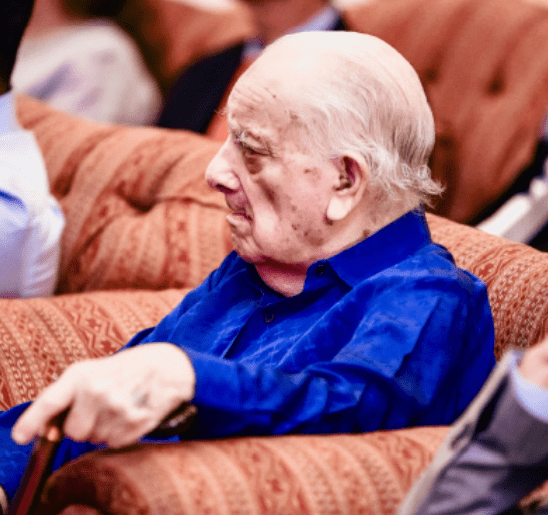
I’m very grateful, to start with my wife Shahnaz, and her sisters being here and of course my son but above all, my grandchildren, Amani to start with and then of course Elena and Suleiman. What greater legacy can you leave than having such wonderful grandchildren? Each one is an absolute character and soul in his own right and absolute in her own right. People ask me what you are doing for them. I wish some of you could come to our brunch, which I invited all of you on Sunday and see the Amani Bagh, which I’ve named after my first granddaughter. And then of course Elena Heights, which I named after my second granddaughter, and of course Suleiman Lodges just come up and Suleiman Base, which he named himself near Changla Gali, is also coming up. Then I’d like to thank my speakers one by one. Starting with Air Marshall Masood Akhtar. What can I say, Masood, I’m grateful to you, we worked together. It’s only when you’ve been very kind to Moeed Yousuf when he copy-pasted most of my National Security Strategy of 2002 and gave it as his own. Of course, initially, I was in that team and then suddenly I stopped getting invited to his meetings. I realized it only when the national security policy came out and I saw it. Therefore, Air Marshall Masood Akhtar, you will be happy to know that I am now going to spend the rest of my days whatever life I left, writing out the National Security Strategy of Pakistan. I’ve updated my previous work, I’ve updated the 72 Pages and it has become now 108 pages, to give the concept. And then I’ve talked about the preamble and whatever is happening. Not stopping there, then I talked about the said challenges and how to deal with them. The challenges are many, whether it’s food security, water security, whether it’s getting rid of Institutions, then taxation, how to simplify taxation, how to rationalize the Armed Forces to meet Modern Warfare etc. I think we are, we should learn both from what happened in the Gulf War and then what is happening in the Middle East now, there is a different concept of warfare, using drones, etc.
Iran Absolute set new of standards. We should learn from this, we cannot still stay bogged down in our complete ideas that we can stay static and still go on. Then, what is happening in the education sector is awful. I’m of course so happy to see a lot of Gallians here and I’m proud of you, I remember always you know we always have the slogan never given. when I escaped from the camp there was a war camp I had that was never given right and today I’m proud that you are here thank Mujahid Alam for bringing them here, all the prefects and the high achievers all the way from Ghora Gali and I learned a lot in Ghora Gali. When there used to be lightning and rain we used to go on a paper chase so lightning and rain didn’t affect us, that was the concept at that time.
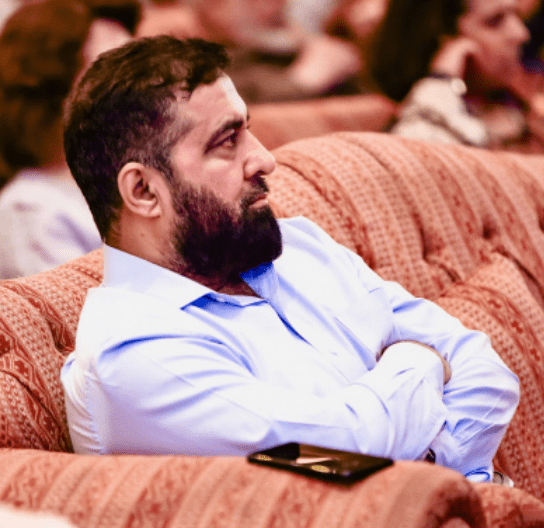
I would say that you know what the main thing I learned in Ghora Gali was to set the cause above renown, to love the game beyond the prize, to honour while you strike him down, the foe that comes with fearless eyes. So, these are the things I learned, among other things, that I learned in Ghora Gali.
Then I turn to General Ali Kuli what can I say, you know my sister Nilofar is sitting here and I can only say that they’ve been the closest friends that I’ve had for many years. My sister’s death also became even closer and General Ali Kuli has been very tolerant of me because I keep on giving advice which I think he does not need from time to time but I think a good friend is only that who gives the correct perspective. I’m so grateful to you Nilofar and to Ali for being such good friends of mine and good friends of our family all along. Also, to have me on part of your business as director of your industries, of your businesses and it’s a great honour to serve with you in aviation.
Now, let me tell you one thing about General Ali Kuli which most of you do not know because there has been something said about the signing of the surrender. General Niazi surrendered to Sam Manekshaw at 9:00 in the morning. General Ali Kuli and the entire Aviation flew out from East Pakistan at 3:00 in the afternoon. They did not surrender they were 1 mile away from the Indian army’s main force inside the Dhaka Cantonment, they took all the helicopters except one that was left behind.
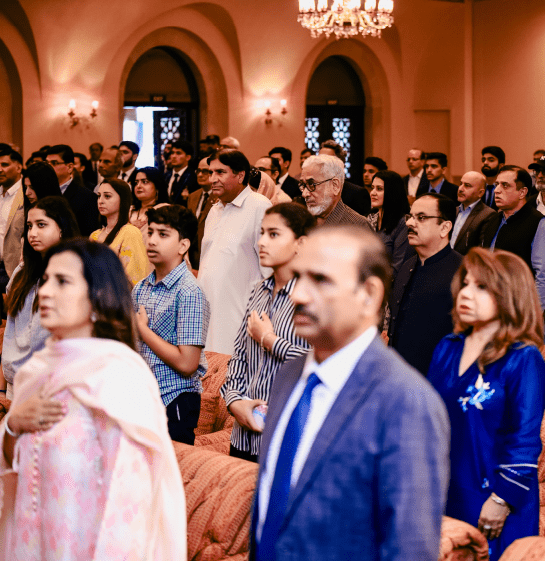
They brought all the nurses out with them, and they brought the entire Aviation contingent. They flew out first of all towards Agartala, then South into Burma, circled over and then of course threw their weapons into the sea and landed in Burma. But he did not surrender and General Ali Kuli’s father was a very good friend of General Sam Manekshaw sent him a message “I have your son in The Jug” and General Habibullah sent back a message: “You will never have any son of mine in the jug,” and he did not surrender. So that was a great thing that not many people knew these things of course, I had a vested interest when I was speaking to Nawaz Sharif about this thing Mushahid, myself and Mr Sartaj Aziz three of us and we kept on telling him to go according to the seniority go according to seniority professionally when you reach the rank of lieutenant General all are competent without fail all are competent so don’t pick and choose unless there’s something very drastically wrong with that, do not pick and choose. That is General Ali Kuli for you and I’m very proud of our relationship. Of course Mushahid, what can I say about Mushahid, we’ve done a long journey together, Mushahid would walk in and we eat Daal together from the “langar” and we would enjoy the Daal and we discuss things, a lot of things and unfortunately that did not work out. I thought and I did propose at that time many times. I said he’s doing a tremendous job as the Information Secretary you need Mushahid as your Foreign Minister.
Mushahid knows and his grasp of facts is so clear about also the small things in detail, he knows and like a good soldier he can think on his feet which is very necessary for a Foreign Minister. He didn’t have to read out from a script or to read a story, he’s done it today, he could speak out without having to read out from a script. Of course, one of the most honourable people I know and it’s a great honour to be with you. Shahid your relationship, like you said, goes back to your uncle who you did not name, Brigadier Taj, was one of the bravest officers one has ever come across, he was decorated in both wars and he would have got a third Sitara e Jurat. Let me tell you Brigadier Mahmood is here and he was there also in the Chhor desert, our Brigade Commander disappeared for 2 three days, we didn’t know where he was. De facto literally Brigadier Taj had taken over Brigade 44, Punjab which was our Battalion which became a true defence force with 45 Punjab and 46 Punjab. He said one thing very clearly to us, “there’s no going back, we will die here.” you know Shahid how proud you must be you’re an industrious father and your industrious uncle and I tell you that you know I’ve served under a very good commanding officer Brigadier Mahmood and of course, I have Zahir Hussain’s son here i.e. General Shakeel. He is working with me now, and he was only 8 years old when I first got to know him. His father was my company Commander first, and then my Commanding Officer.
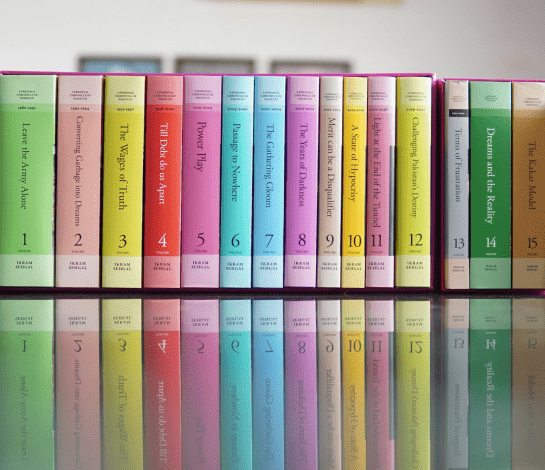
Now, about Brigadier Taj, he was a very good commanding officer and I was very lucky that way. I once came along and I told him, I said Shahid you’re in the wrong political party you know, ultimately, I think I’ve been proven right. So, the point is I did say that in the speech at the last book launch. I called him, Prime Minister Shahid Khaqan Abbasi, and I say it again today, former Prime Minister and future Prime Minister of Pakistan. You do not come across many people having such values you know he just stayed the course because of loyalty the loyalties that are ingrained be cause of his family history. He stayed with loyalty because he disagreed with a lot of things he ultimately, now circumstances have overcome that loyalty. But Shahid we look forward to whatever the future brings for you but I am sure that you will bring that honesty and integrity to politics that is very much required in this country. I will thank the other people in this room, Excellencies who have come here I would also like to thank IG Rai Tahir, he is one of the people I’ve known since he was an SP. He is one of the people I looked up to for immediate reaction and today he is head of NACTA, the toughest job I think in this world.
What he knows today actually and what is he doing is something we cannot discuss in public. but you know whenever I want to know something that I need to know which is crucial, I turn to him for advice. He’s got a very correct perspective so more power to you. I would like to also thank General Kamal from Bangladesh, he could have been Chief of Army staff if he had more pro-Indian views but he didn’t unfortunately at that time so, he retired as a general and working with the United Nations. Now, he’s going to retire next month in September from one of the toughest jobs in the world in Afghanistan.
Among other people over here, I find Asif Yaseen Malik and of course Javed Alam and people you know all over, my sisters-in-law, and in the crowd, I can see a lot of faces I would like to name them but it is not possible. I would not like to forget my course mates who are here Ahsaan Saleem, Ishaque, Hassan Sardar but you know it’s good to see your course mates with you at this time. I’d also like to mention when I was dismissed from the Army I did not have money to go home. A canteen contractor in Balochistan gave me 600 rupees to go home. I brought that man today, I requested him to come, he is not well but still came. Hayat Khan, his 600 rupees in 1974 carried me here, thank you Hayat. I asked him at that time, “How am I going to return your 600 rupees? He said, “Sir, when you will earn enough, you’ll return it to me.” I am proud that his son also works with me today, Mohsin. I’m very lucky to have a lot of children of ex-servicemen of mine working with me and it’s before that and children and I would also like to mention here somebody who’s not here but who was laboriously writing a long note for me, Lieutenant General Lehrasab Khan one of the finest soldiers I’ve known one of the bravest soldiers I’ve known, again, wounded twice in two Wars and have Sitara e Jurat. He was one of the few people who advised General Waheed Kakar not to take an extension. He and General Ali Kuli said, don’t take an extension.
I’m proud to say that 25 of the children of my guards study on full scholarship in the Jajja Cadet College and we’ve been doing this for the last 10 years now and I think we have more than almost 100 children who have gone through when we started this scholarship. One of them came and talked and he mentioned that he was considered by Harvard University. Son of a guard. That is the talent you have and I would like to mention the people from my company, all are loyal, hardworking, and dedicated. And if you ask, what is your blessing? That is my blessing to have such people working with me whether it’s in Security Services whether it’s in IT services. In IT services many people do not know but I think Brig Aamir Shahzad is sitting here from PTA he will tell you that we are changing the destiny of the poor man with one of our products. Mr Sargana is sitting here with me from PTA and they were so positive for us, both the State Bank of Pakistan and the PTA and they said this is the thing this is the product, 80% of the adult population of Pakistan does not have bank accounts so we created that platform with their help with their support. Today, we are recognized by the World Economic Forum (WEF) as the most innovative platform in the world for helping in Financial Inclusion and women empowerment. Luckily the government does not know much about us otherwise even that would go down. Once at Davos, Shahid was asked a question when people got up and said his answer was very good “he said this will end too if the government get involved.”
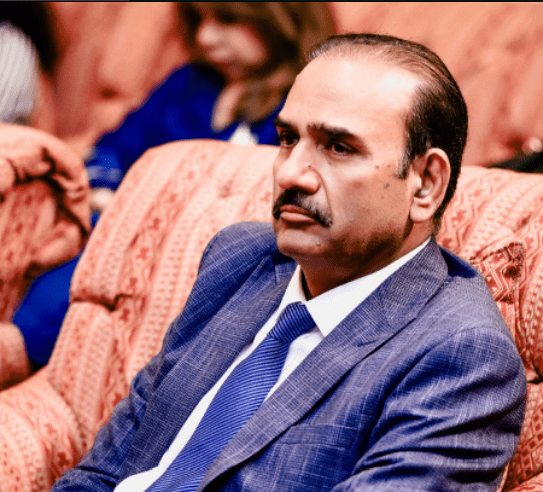
I want to again turn to my son, thank you Zarrar, you know it’s always a blessing to have a wonderful son like you. One is always proud of one’s son but I’m prouder than most. You know he’s now the Chairman of the company, I didn’t want him to end up like the Prince of Wales waiting for his mother to die, so I said please become the chair of the company. I just have a nominal share in the company. I almost own no land because everything is distributed among my children and friends etc. In the end, what do you take away with you? I would like to say that in the end, you take away what was quoted earlier by Rumi, that was the right thing, “if you can live on the hearts of men then you are going to live on forever.”
I may have missed out some people and I apologize for that. I would like to end with two quotes. the first quote is from Shakespeare, Mark Anthony’s speech “The good that men do is of interred with their bones, the evil lives after them” That was Mark Anthony at his funeral oration for Julius Caesar. and the other one was General Douglas MacArthur, his favourite address to Congress by President Truman and he said “old soldiers never die they simply fade away” so I would like to end with paraphrasing both of them together and said “old soldiers who do not die they should learn when to fade away.”


